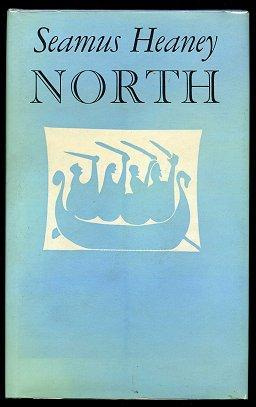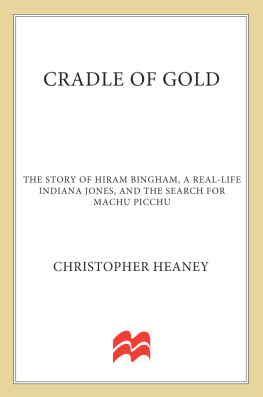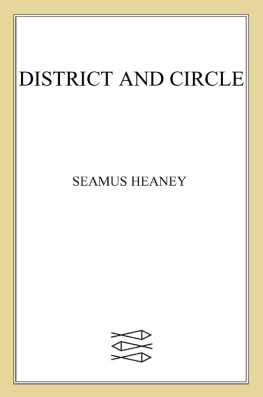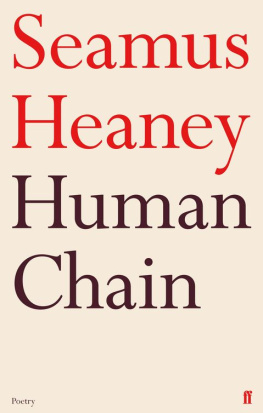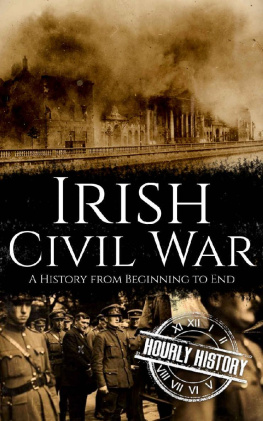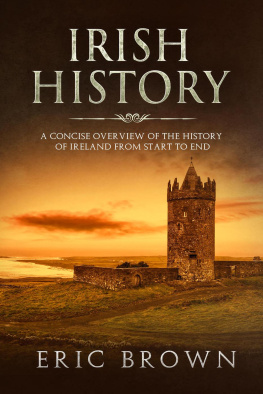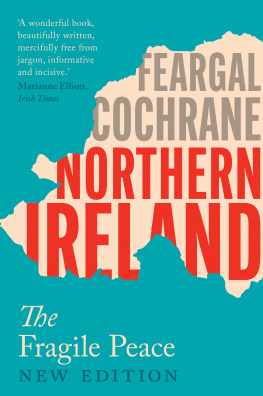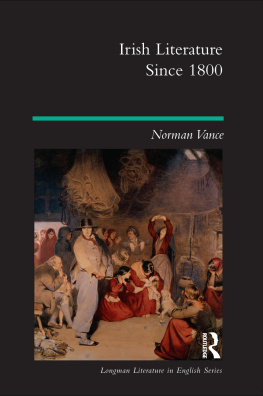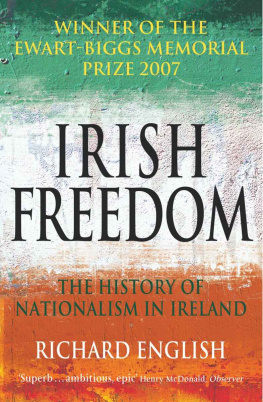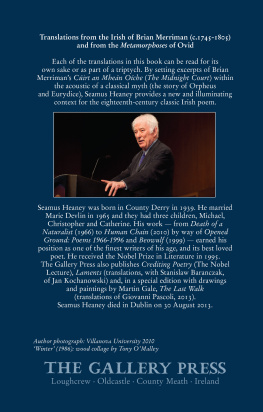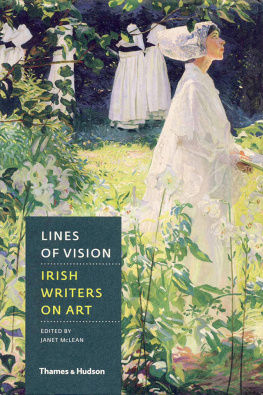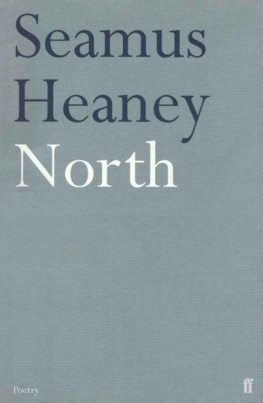The author gratefully acknowledges the assistance of the American Irish Foundation during 1973/4 when he was recipient of their annual Literary Award. Acknowledgements are due to the editors of the following where some of these poems appeared for the first time: Antaeus, The Arts in Ireland, Causeway (BBC Radio 3), Encounter, Exile, Hibernia, The Irish Press, The Irish Times, Irish University Review, James Joyce Quarterly, The Listener, The New Review, Phoenix, The Times Literary Supplement ; and to the editors of the following anthologies: The Faber Book of Irish Verse, New Poems 1972 1973 and New Poems 1973 1974 (Hutchinson), and Soundings 72 (Blackstaff, Belfast). Eight of the poems appeared in a limited edition entitled Bog Poems (Rainbow Press).
Mossbawn: Two Poems in Dedication
for Mary Heaney
I. SUNLIGHT There was a sunlit absence. The helmeted pump in the yard heated its iron, water honeyed in the slung bucket and the sun stood like a griddle cooling against the wall of each long afternoon.
So, her hands scuffled over the bakeboard, the reddening stove sent its plaque of heat against her where she stood in a floury apron by the window. Now she dusts the board with a gooses wing, now sits, broad-lapped, with whitened nails and measling shins: here is a space again, the scone rising to the tick of two clocks. And here is love like a tinsmiths scoop sunk past its gleam in the meal-bin.
2. THE SEED CUTTERS
They seem hundreds of years away. Breughel, Youll know them if I can get them true.
They kneel under the hedge in a half-circle Behind a windbreak wind is breaking through. They are the seed cutters. The tuck and frill Of leaf-sprout is on the seed .potatoes Buried under that straw. With time to kill, They are taking their time. Each sharp knife goes Lazily halving each root that falls apart In the palm of the hand: a milky gleam, And, at the centre, a dark watermark.
Antaeus
When I lie on the ground I rise flushed as a rose in the morning.
Antaeus
When I lie on the ground I rise flushed as a rose in the morning.
In fights I arrange a fall on the ring To rub myself with sand That is operative As an elixir. I cannot be weaned Off the earth's long contour, her river-veins. Down here in my cave, Girded with root and rock, I am cradled in the dark that wombed me And nurtured in every artery Like a small hillock. Let each new hero come Seeking the golden apples and Atlas. He must wrestle with me before he pass Into that realm of fame Among sky-born and royal: He may well throw me and renew my birth But let him not plan, lifting me off the earth, My elevation, my fall. 1966
Belderg
'They just kept turning up And were thought of as foreign'-- One-eyed and benign They lie about his house, Quernstones out of a bog.
To lift the lid of the peat And find this pupil dreaming Of neolithic wheat! When he stripped off blanket bog The soft-piled centuries Fell open like a glib: There were the first plough-marks, The stone-age fields, the tomb Corbelled, turfed and chambered, Floored with dry turf-coomb. A landscape fossilized, Its stone-wall patternings Repeated before our eyes In the stone walls of Mayo. Before I turned to go He talked about persistence, A congruence of lives, How, stubbed and cleared of stones, His home accrued growth rings Of iron, flint and bronze. So I talked of Mossbawn, A bogland name. 'But moss?' He crossed my old home's music With older strains of Norse. 'But the Norse ring on your tree?' I passed through the eye of the quern, Grist to an ancient mill, And in my mind's eye saw A world-tree of balanced stones, Querns piled like vertebrae, The marrow crushed to grounds.
Funeral Rites
I
I shouldered a kind of manhood, stepping in to lift the coffins of dead relations.
Funeral Rites
I
I shouldered a kind of manhood, stepping in to lift the coffins of dead relations.
They had been laid out in tainted rooms, their eyelids glistening, their dough-white hands shackled in rosary beads. Their puffed knuckles had unwrinkled, the nails were darkened, the wrists obediently sloped. The dulse-brown shroud, the quilted satin cribs: I knelt courteously, admiring it all, as wax melted down and veined the candles, the flames hovering to the women hovering behind me. And always, in a corner, the coffin lid, its nail-heads dressed with little gleaming crosses. Dear soapstone masks, kissing their igloo brows had to suffice before the nails were sunk and the black glacier of each funeral pushed away.
II
Now as news comes in of each neighbourly murder we pine for ceremony, customary rhythms: the temperate footsteps of a cortge, winding past each blinded home.
I would restore the great chambers of Boyne, prepare a sepulchre under the cupmarked stones. Out of side-streets and bye-roads purring family cars nose into line, the whole country tunes to the muffled drumming of ten thousand engines. Somnambulant women, left behind, move through emptied kitchens imagining our slow triumph towards the mounds. Quiet as a serpent in its grassy boulevard, the procession drags its tail out of the Gap of the North as its head already enters the megalithic doorway.
III
When they have put the stone back in its mouth we will drive north again past Strang and Carling fjords, the cud of memory allayed for once, arbitration of the feud placated, imagining those under the hill disposed like Gunnar who lay beautiful inside his burial mound, though dead by violence and unavenged.
North
I returned to a long strand, the hammered shod of a bay, and found only the secular powers of the Atlantic thundering.
North
I returned to a long strand, the hammered shod of a bay, and found only the secular powers of the Atlantic thundering.
I faced the unmagical invitations of Iceland, the pathetic colonies of Greenland, and suddenly those fabulous raiders, those lying in Orkney and Dublin measured against their long swords rusting, those in the solid belly of stone ships, those hacked and glinting in the gravel of thawed streams were ocean-deafened voices warning me, lifted again in violence and epiphany. The longship's swimming tongue was buoyant with hindsight-- it said Thor's hammer swung to geography and trade, thick-witted couplings and revenges, the hatreds and behindbacks of the althing, lies and women, exhaustions nominated peace, memory incubating the spilled blood. It said, 'Lie down in the word-hoard, burrow the coil and gleam of your furrowed brain. Compose in darkness. Expect aurora borealis in the long foray but no cascade of light. Keep your eye clear as the bleb of the icicle, trust the feel of what nubbed treasure your hands have known.'
Viking Dublin: Trial Pieces
I
It could be a jaw-bone or a rib or a portion cut from something sturdier: anyhow, a small outline was incised, a cage or trellis to conjure in.
Like a child's tongue following the toils of his calligraphy, like an eel swallowed in a basket of eels, the line amazes itself, eluding the hand that fed it, a bill in flight, a swimming nostril.
II
These are trial pieces, the craft's mystery improvised on bone: foliage, bestiaries, interlacings elaborate as the netted routes of ancestry and trade. That have to be magnified on display so that the nostril is a migrant prow sniffing the Liffey, swanning it up to the ford, dissembling itself in antler combs, bone pins, coins, weights, scale-pans.

